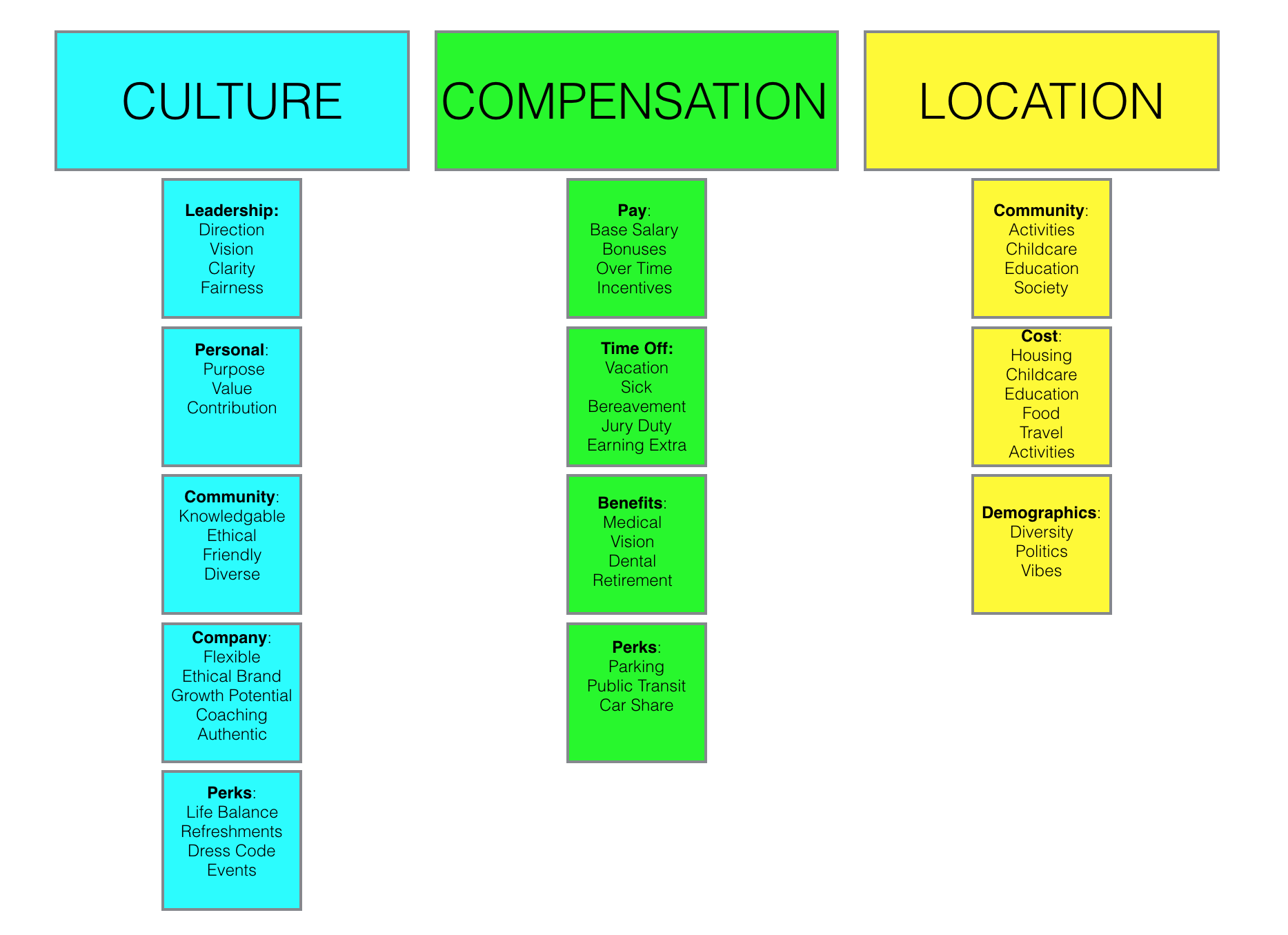There are countless articles recently about how to attract talent. I see my newsfeed with the same titles over and over: “6 Key Factors to Attracting Talent” or “5 Factors You Need When Hiring.” The buzzwords are all the same “key factors,” “talent”, “hiring.” Many people focus on things Millennials want vs Gen X, etc…
Within all of these articles, they fail at identifying the main value proposition each person considers when faced with a professional change:

While each person, situation, and industry are different, these are the areas we consider the most when looking for a professional change. I would argue they also fall in this order: Culture, Compensation, Location. Let’s look at some examples:
+ Compensation + Location – Culture
After speaking with a variety of people across a variety of industries and locations, each person stated they ultimately turned down a job offer, rejected a recruiter, or left a company because of CULTURE.
The saying, “People don’t leave jobs, people leave people” is the most common motivation behind job churn. Most people, regardless of the pay and desirable location, will not place themselves into a bad culture. If the pay is so substantial that they are willing to take a chance, this will typically only be for a few years until something better comes along.
Very rarely will this combination ever attract and retain talented people.
The culture of the workplace is easily the most impactful in deciding to join a company and deciding to leave a company. It embodies the leadership, your personal value, your colleagues, community, and ethics.
Consider this: a week has 168 hours total. Most likely 50 hours are going directly to your job, and at least another 15 hours are indirectly going to your job in getting ready each day, commuting, off-hour emails, calls, etc. Then another 56 hours each week should go to sleep. This leaves you only 47 hours a week for everything else. This is your adulating activities like cleaning, exercise, and errands. It is also the time you have to spend with all of your friends and family. It is the time you have for your hobbies and personal learning.
At the end of the day, you give about 60% of your waking life to your company. While some people try to say, “it’s only a job” or “it’s just a paycheck,” most people realize that your professional contribution is commensurate to your life contribution. It is how you spend the majority of your time.
This is the very reason why people:
- Do not desire to work for unethical companies
- Are upset when their efforts are under valued
- Do not want to contribute to the success of bad leaders
- Value the social comradery in the workplace
- Appreciate the small efforts to make the life balance easier with free food, refreshments, laundry services, and any other perk that brings the 60/40 split closer to 50/50. Because that’s what work-life balance is all about.
Side note, some companies have started placing a strong emphasis on creating a narrow culture of the same type of people, placing weird emphasis on fashion sense and even the idea of nurturing a “bro culture.” Companies should be mindful to not confuse culture with “cult.” Culture comes from strong leadership, personal value and accountability, direction, ethics, and very important: DIVERSITY!
+ Location + Culture – Compensation
It comes as no surprise that compensation is a major factor in career decisions. People need to make enough money to support the cost of living, their families, their expected lifestyle, their location, etc.
If a company offers an amazing work culture and leadership in a desirable but expensive city, their pay needs to match it. The stress of struggling to afford the location has a great impact on the quality of life. Work culture is great, but an interesting life outside of work is just as important.
On the flip side, paying high wages in an undesirable location doesn’t always prove to be enough either. People will tolerate a bad location for high pay for a limited number of years. But once they hit that sweet spot in their savings, they will most likely leave. I suspect a good number of start-ups come out of this arrangement.
Compensation needs to balance:
- Time
- Effort
- Expertise
- Location
- Cost of Doing Business
- And many other factors unique to each company and position
Compensation also includes benefits like medical insurance, paid time off, and other expenses valuable to your staff.
Ultimately, the compensation needs to make sense for your industry, your people, and your location.
+ Culture + Compensation – Location
Location is an extension of work culture and compensation.
While work culture is important, so is the culture of society. If you are really into fine art, high fashion, and theater, Denver may not be the best culture for you. On the flip side, if you love the wilderness, mountains, and winter sports, you may struggle in Miami. The culture of society gives way to your de-stressing activities, friend base, and really, your happiness.
Within all of this, your compensation dictates your quality of life within that location. Let’s say you LOVE New York City but you are considering a position with a base salary of $40,000 (approx.. $2,400 a month in a city where rent alone will cost you about $1800 if you are lucky). Your ability to participate in activities or even afford housing and food are very limited. The financial impact would be substantial on stress, social life, health, and freedom.
It is not a secret that certain locations are more desirable than others. Location offers things that are important beyond the job:
- Destination spots (beach, mountains, city life, etc)
- Affordable cost of living
- Low crime
- Great schools
- Social activities
- Job growth potential
- Social culture
People care about their life and happiness far more than they care about your company’s success. Location has a significant impact on life.
Growth Potential
Secondary to overall work culture is growth potential. This is embodied in all three areas of culture, compensation, and location. Truly talented people will continue to grow, nurture, and expand their talent. They will both diversify and sharpen their expertise strategically.
The best companies structure all three areas in a manner that permit growth. They create a culture of coaching and cross training, a compensation that includes educational allotments and incentives, and a location with industry opportunities, preferably in-house but nonetheless. Anyone who is a desirable hire will need and want to grow. In order to have these people on your team, you have to offer the growth potential.
Do you have 3 out of 3? Comment below!


